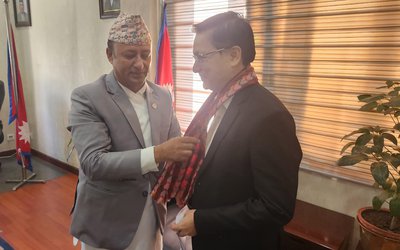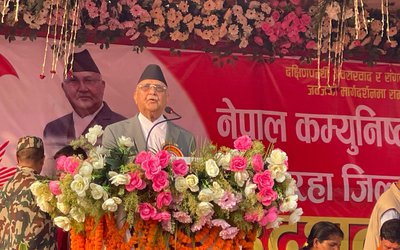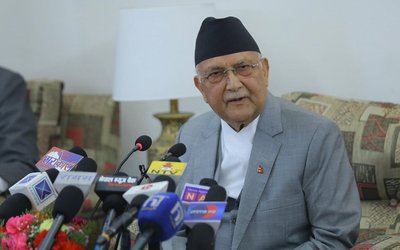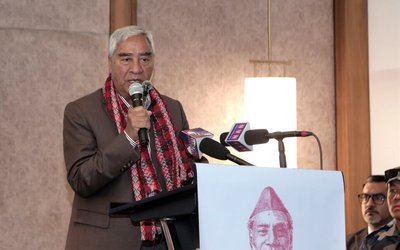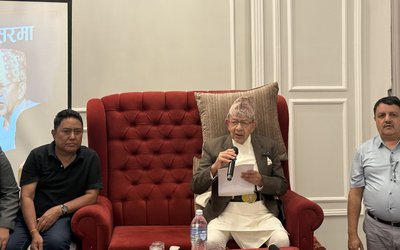
Ignored and undermined, the urban poor have suffered pain which is much bigger than faced by other communities following the devastating earthquake of April and May. As the earthquake mostly damaged the old houses which were located in semi-urban cities, dominated by subsistence farmers, this will have direct impact on the food security.
At a time when Nepal is preparing for the post-earthquake disaster programs in affected areas, South Asia Watch on Trade, Economics & Environment (SAWTEE), in coordination with Oxfam, organized a national consultation workshop on Impact of the Earthquake on Food Security and Livelihood on Urban Poor in Nepal.
Addressing the program, Chief Guest Dr. Yubaraj Khatiwada, Vice-Chairman of the National Planning Commission, recognized the growing importance of urban poverty and reiterated the government’s commitment to address the issue. Dr. Khatiwada argued that focus should be towards changing people’s food habits and incentivizing urban farming to achieve better food security.
Presenting the findings of the study on impact of earthquake on food security, Neelu Thapa, Program Coordinator at SAWTEE, mentioned that the loss of income and agricultural land has made food security the most important challenge for the urban poor affected by the earthquake.
Based on a study of over 150 houses of three quake affected districts of Kathmandu Valley, the report, among others, highlights how the number of urban poor will increase following the earthquake.
Thapa highlighted the need for various short, medium, and long term measures including cash-transfers, food for work and provision of financial services to assist the urban poor affected by the earthquake. Gopi Khanal, Joint Secretary at Ministry of Local Development, said that the announcement of municipalities will have positive implications in the process of poverty alleviation.
Yuvraj Ghimire, Chief Editor, Annapurna Post, as a discussant of the session, said earthquake has devastated the country in many directions.
Chairing the session, Dr. Posh Raj Pandey, Chairman, SAWTEE, identified inequality, terrorism, natural disasters and climate change as the four worst global challenges.
Dr. Pandey said that the major earthquakes that struck Nepal threatened the livelihood of thousands of households in the affected districts, and argued that the government’s action plan in response to the disaster does not adequately focus on the urban poor.
Speaking on climate change, Dr. Pandey highlighted that effects of climate change are getting more pronounced and impacts of such effects are likely to be felt more in hills and mountains of Nepal. He stressed that impact assessment of these areas is crucial to understand the impact of climate change in the region.
Presenting the paper on Impact of Climate Change on Agriculture Adaptation Practices and Gender, Shaleen Khanal, Research Officer at SAWTEE, presented the findings of another study on the impact of climate change on agriculture adaptation practices and gender. Based on the study conducted in Mustang, he highlighted the changes in agriculture productivity and evolving cropping patterns throughout the region in response to climate change.
Khanal further pointed out that the climate change adaptation practices in the district had negatively affected women who now faced increasing workload. Sabnam Shiwakoti, Program Director, Ministry of Agricultural Development; and Shuvechha Khadka, Senior Researcher at Institute for Social and Environmental Transition provided valuable feedback as the discussants of the session.
Closing the session, Dr. Hiramani Ghimire, Executive Director of SAWTEE, suggested that climate change related adaptation and mitigation efforts should be approached in a holistic manner, with coordinated efforts by the various governmental and non-governmental agencies involved.
In the event, participated by more than 50 experts from the public, non-government and academic sectors, discussions focused on how climate change is affecting livelihood and food security.
- IME GROUP: Expands Into Paper Industry
- Mar 24, 2025
- CPN UML: Instigated By India
- Mar 23, 2025
- ADB’S CHIEF ECONOMIST: Nepal Reduces Poverty
- Mar 11, 2025
- FM DR. DEUBA: A Successful Visit
- Mar 11, 2025
- MD GHISING: Target Of Personal Grudge
- Mar 09, 2025
